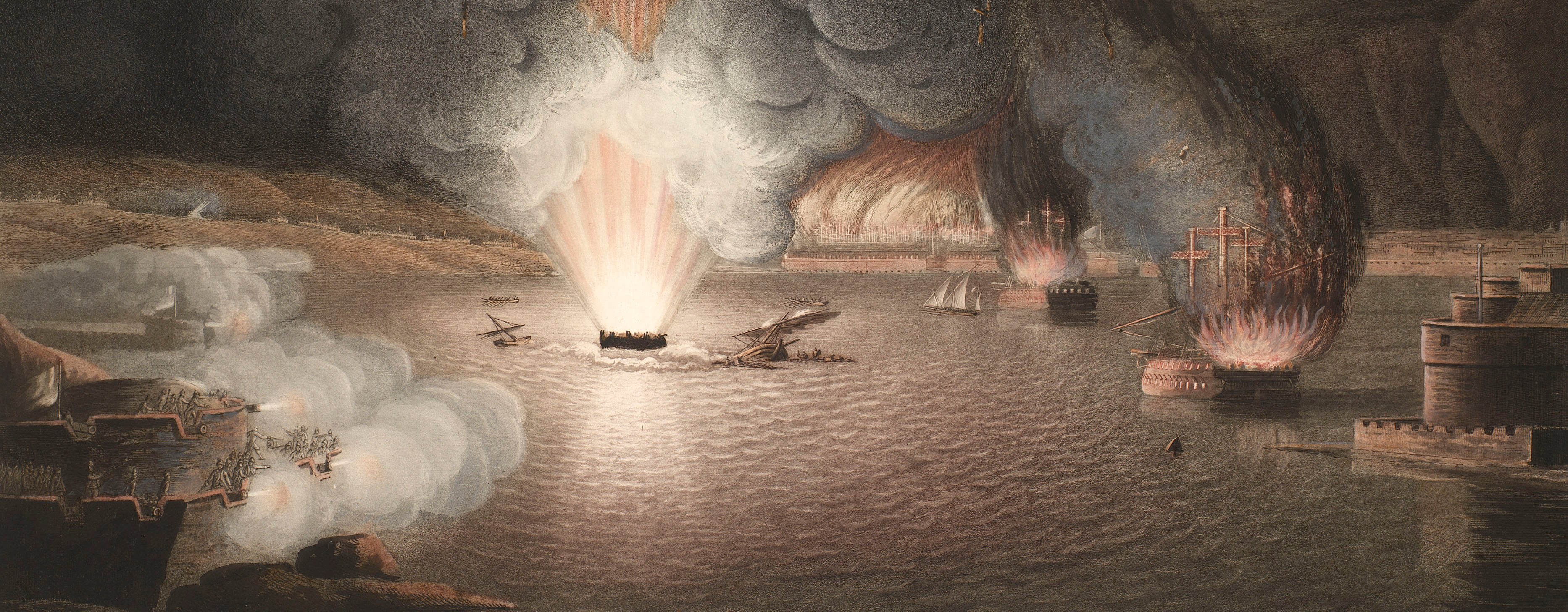
French Revolutionary Wars (1792-1802)
Maps and prints of naval engagements collected by George III during the decade of war
Holland, Callantsoog and Kijkduin, 1799 (Callantsoog, North Holland, Netherlands) 52°50'24"N 04°41'45"E; (Kijkduin, North Holland, Netherlands) 52°57'00"N 04°43'00"E
published 1 Dec 1800Aquatint with engraving; printed on paper; laid down on paper, the paper backing brought round the edges of the recto | 48.5 x 70.9 cm (image) | RCIN 735078
This exercise was part of the Anglo-Russian expedition to Holland (also known as the Helder Expedition), a campaign which lasted from the landing of the British troops, shown in this view, on 27 August 1799, to 19 November 1799. The objective was to neutralise the Batavian fleet and to promote a local uprising against the Batavian government.
The name of Keick Down, which appears in the title of this print, probably refers to the dunes known as 'Kijkduin' (52°57'00"N 04°43'00"E), about 10 km (6.2 miles) north-east of the actual landing place at Callantsoog. The view is taken looking south-west, with the grassed dunes of the Dutch coastline seen rising from the beach. The fierce weather during the previous week had prevented the British fleet from making landfall and, even though it had abated sufficiently to allow the troops to land, the strength of the westerly winds can be seen, in the view, in the rough seas and the pennants and flags extended horizontally from the masts of the ships, and on the standards or colours which are being carried over the dunes.
In the left foreground stand the two commanding officers; on the left is Sir Ralph Abercromby, and to his left, pointing out to sea, is possibly Vice-Admiral Sir Andrew Mitchell (1757-1806), to whom this print is dedicated, who had the charge of the transports for the expedition. It is also possible that the naval figure might be Admiral Adam Duncan, 1st Viscount Duncan of Camperdown (1731-1804), who had joined the fleet the previous week and supervised the disembarkation of the troops. In the centre foreground, a couple of sailors are using a windlass to raise the barrel of the cannon onto the gun carriage.
One of a pair of aquatints by Robert Dodd; the companion print is at RCIN 735079. Parker does not give the year of publication which is 1800, as recorded in the imprint.
For further reading, see:
J.K. Laughton, 'Mitchell, Sir Andrew (1757–1806)', Dictionary of National Biography, Oxford, first published 2004; online edition 2008.
P.K. Crimmin, 'Duncan, Adam, Viscount Duncan (1731–1804)', Dictionary of National Biography, Oxford online edition 2008.
D. Gates, 'Abercromby, Sir Ralph, of Tullibody (1734–1801)', Dictionary of National Biography, Oxford online edition 2007.
Condition: no fold lines.
? Robert Dodd (1748-1815) (artist and publisher) [bottom right, aquatinted in view, initials:] RD; [bottom centre, below title:] [bottom centre, below title:] Published Dec. 1.st 1800. by Rob.t Dodd, 41. Charing Cross: six doors from the Admiralty
Sir Andrew Mitchell (1757-1806) (dedicatee)
Subject(s)
Army-GBGeneral Sir Ralph Abercromby (1734-1801)Sir Andrew Mitchell (1757-1806)Royal NavyWatermark: [on backing paper:] 1794 JWHATMAN
Condition: no fold lines
44.7 x 70.9 cm (neatline)
48.5 x 70.9 cm (image)
51.7 x 76.6 cm (platemark)
53.1 x 77.7 cm (sheet)
Printed title:
The BRITISH TROOPS landing in HOLLAND. / View of the second Division of the British Army commanded by Sir Ralph Abercromby, landing on the Beach near Keick Down on the 27.th of August 1799, covered by the Fleet and Gun Vessels under the Command of Vice Admiral Mitchell / to whom this Plate is most respectfully inscribed by his obliged humble Servant / Robt Dodd. [bottom centre, below view]
Annotations:
George III heading [black pencil:] Military The Landing of the British Troops in Holland 27 Aug 1799 Port folio No 2.
Other annotations: (Recto) none. (Verso) [bottom left, black pencil, obscured by paper backing: the George III heading; bottom left, black pencil:] 147.a; [top right, black pencil:] 46; [bottom right, black pencil:] 43; [centre, black pencil, obscured by paper backing:] 43.
George III catalogue entry:
Holland View of the second Division of the British Army commanded by Sir Ralph Abercromby landing on the Beach near Keick Down in Holland on the 27.th of August 1799; covered by the Fleet and Gun Vessels under the command of Vice Admiral Mitchell: by R. Dodd, 1800.
Subject(s)
Callantsoog, North Holland, Netherlands (52°50'24"N 04°41'45"E)
Kijkduin, North Holland, Netherlands (52°57'00"N 04°43'00"E)
Bibliographic reference(s)
P.K. Crimmin, 'Duncan, Adam, Viscount Duncan (1731–1804)', Dictionary of National Biography, Oxford online edition 2008.
D. Gates, 'Abercromby, Sir Ralph, of Tullibody (1734–1801)', Dictionary of National Biography, Oxford online edition 2007.
J.K. Laughton, 'Mitchell, Sir Andrew (1757–1806)', Dictionary of National Biography, Oxford, first published 2004; online edition 2008.
H. Parker, Naval battles from the collection of prints formed and owned by Commander Sir Charles Leopold Cust, With an introduction by C.N. Robinson, London, 1911, no.147.a
Page revisions
25 May 2024
Current version






